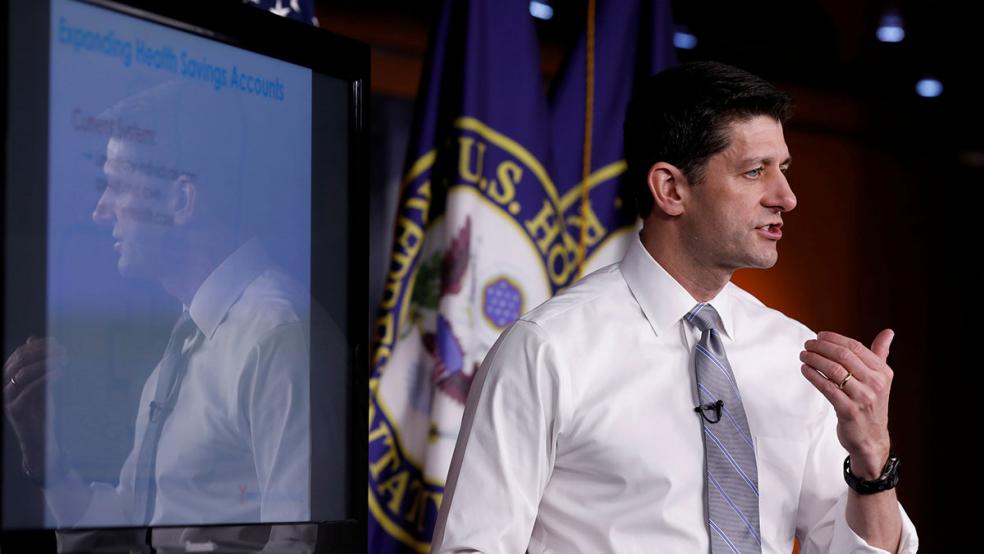Support for the GOP plan to replace the Affordable Care Act is collapsing quickly in the House, where both conservative and moderate Republicans have been stunned by a Congressional Budget Office forecast that as many as 24 million Americans could lose their insurance coverage over the coming decade.
House Speaker Paul Ryan (R-WI) and the Trump administration continue to press for approval of the Republican replacement plan in the House in the coming weeks, despite mounting warnings that it has no chance of winning approval once it reaches the Senate without a major overhaul.
Related: How Health Care Is Crippling the Speaker of the House
But many Republicans are bridling at this, fearing that a vote on an increasingly unpopular health care plan with no prospects for ultimate passage will cost them dearly in the 2018 mid-term elections when their party could risk losing the gains in the last November election.
That’s what happened to the Democrats in 1993 when President Clinton and House Democrats pushed through a deficit reduction bill with an energy tax increase that died in the Senate. Many of those House Dems lost their seats, and pundits said they’d been “BTUed.”
Related: How the GOP Health Plan Would ‘Devastate’ Mentally Ill, Addicted
With prominent Republican senators including Tom Cotton of Arkansas, Ted Cruz of Texas, Rand Paul of Kentucky and Lindsay Graham of South Carolina warning that the legislation would be “dead on arrival” in the Senate, many moderate and conservative House Republicans have begun to oppose the GOP plan.
Rep. Ileana Ros-Lehtinen said on Tuesday that she won’t support the plan because of the high number of people projected to lose expanded Medicaid coverage. “As written the plan leaves too many from my #SoFla district uninsured,” she tweeted. “Need a plan that would do more to protect them.”
Rep. Leonard Lance, a moderate Republican from New Jersey who some view as vulnerable in the 2018 mid-term election, told reporters, “I do not want to vote on a bill that has no chance of passing over in the Senate. The CBO score has modified the dynamics.”
In the wake of the CBO analysis of the GOP replacement plan on Monday showing major long-term savings and stabilizing of premiums but a massive loss in the number of uninsured Americans, the Republican plan itself appears to be collapsing of its own weight. Conservatives complain that the plan doesn’t go far enough in wiping out Obamacare mandates and policies, dismissing it as “Obamacare Lite.” More moderate Republicans fear the plan goes too far by phasing out expanded Medicaid benefits and providing inadequate premium subsidies and other assistance to low and moderate-income Americans.
Related: GOP Replacement Plan Could Send Hospital Costs Soaring Again
With sharp criticism of the plan now coming from both the conservative and more moderate wings of the party in both the House and Senate, Vice President Mike Pence, Health and Human Services Secretary Tom Price and other administration officials scrambled yesterday to salvage the plan.
It’s not what Ryan and the Trump administration want to hear, but many uneasy Senate Republicans yesterday advised the speaker and White House officials to go back to the drawing board and make significant changes.
According to The New York Times, the Senate Republicans want to see a plan that would result in lower insurance costs for poorer, older Americans, and an increase in funding in states with large numbers of hard-to-insure people. Others are alarmed by how many of their constituents would lose Medicaid coverage under the GOP approach and are looking for reassurances that vulnerable beneficiaries won’t have the rug pulled out from under them.
Related: Republican Health Plan -- Good for the Budget, Bad for the Poor and Elderly
Last week, Ryan outlined a three-step process for repealing and replacing Obamacare, that begins with passage of the American Health Care Act in the coming weeks with the help of special budget rules called reconciliation. Then, HHS secretary Price would take administrative action to deregulate the Obamacare marketplace. And third, Congress would have to pass additional legislation to encourage the sale of health care policies across state lines.
White House press secretary Sean Spicer repeatedly referred to this “three-prong” approach during a briefing on Tuesday, arguing that CBO’s projections of millions losing their insurance failed to account for all three of these steps.
But Cotton, a leading critic of the House approach, said dismissively during a recent interview with radio host Hugh Hewitt that: “There is no three-step plan. That is just political talk. It’s just politicians engaging in spin.”





